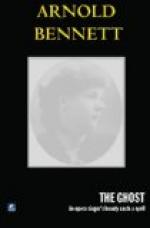I was glad to be out of London, and as the days passed my gladness increased. I had not been pleased with myself in London. As the weeks followed each other, I had been compelled to admit to myself that the case of Alresca held mysteries for me, even medical mysteries. During the first day or two I had thought that I understood it, and I had despised the sayings of Rosetta Rosa in the carriage, and the misgivings with which my original examination of Alresca had inspired me. And then I gradually perceived that, after all, the misgivings had been justified. The man’s thigh made due progress; but the man, slowly failing, lost interest in the struggle for life.
Here I might proceed to a technical dissertation upon his physical state, but it would be useless. A cloud of long words will not cover ignorance; and I was most emphatically ignorant. At least, such knowledge as I had obtained was merely of a negative character. All that I could be sure of was that this was by no means an instance of mysterious disease. There was no disease, as we understand the term. In particular, there was no decay of the nerve-centres. Alresca was well—in good health. What he lacked was the will to live—that strange and mystic impulse which alone divides us from death. It was, perhaps, hard on a young G.P. to be confronted by such a medical conundrum at the very outset of his career; but, then, the Maker of conundrums seldom considers the age and inexperience of those who are requested to solve them.
Yes, this was the first practical proof that had come to me of the sheer empiricism of the present state of medicine.
We had lived together—Alresca and I—peaceably, quietly, sadly. He appeared to have ample means, and the standard of luxury which existed in his flat was a high one. He was a connoisseur in every department of art and life, and took care that he was well served. Perhaps it would be more correct to say that he had once taken care to be well served, and that the custom primarily established went on by its own momentum. For he did not exercise even such control as a sick man might have been expected to exercise. He seemed to be concerned with nothing, save that occasionally he would exhibit a flickering curiosity as to the opera season which was drawing to a close.
Unfortunately, there was little operatic gossip to be curious about. Rosa had fulfilled her engagement and gone to another capital, and since her departure the season had, perhaps inevitably, fallen flat. Of course, the accident to and indisposition of Alresca had also contributed to this end. And there had been another factor in the case—a factor which, by the way, constituted the sole item of news capable of rousing Alresca from his torpor. I refer to the disappearance of Sir Cyril Smart.




